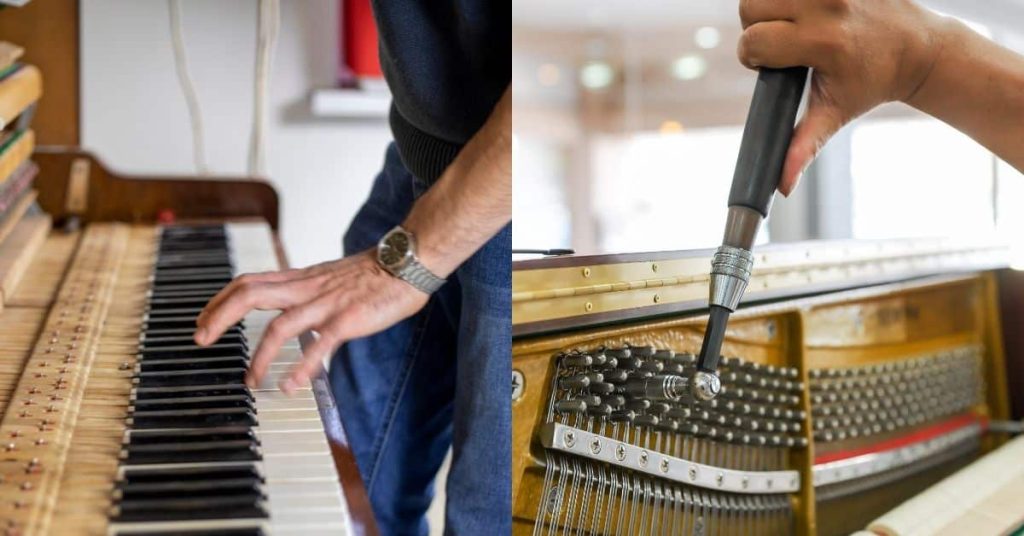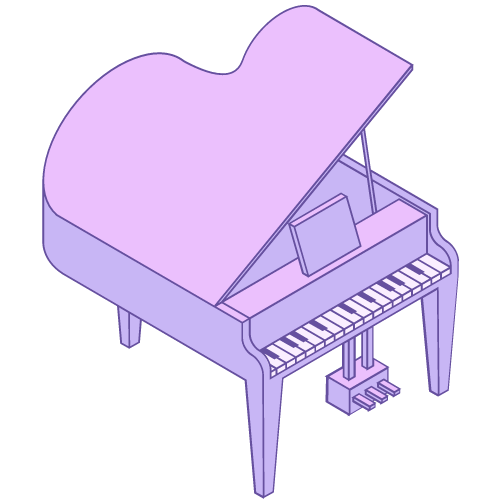Blog
The Importance of Tuning Your Piano Regularly
Pianos are complex instruments, consisting of hundreds of parts that work together to produce sound. One of the most crucial aspects of maintaining a piano’s functionality and sound quality is regular tuning. Whether you have a grand piano, an upright piano, or a digital piano, tuning is essential to keeping your instrument in peak condition. While it’s easy to overlook, regular piano tuning is important for both the musical integrity of the instrument and the longevity of its components.
In this guide, we’ll explore why tuning your piano regularly is so important and how it affects the performance, sound quality, and value of your instrument. We’ll also look at the signs that indicate your piano needs tuning and how often you should tune it.
What Is Piano Tuning?
Piano tuning refers to adjusting the tension of the piano’s strings to ensure they are producing the correct pitch. A piano has 88 keys (in a standard full-size piano), each connected to a string or a group of strings. The tension in each string must be carefully calibrated to ensure the notes sound in tune with one another.

The tuning process is done by a professional piano tuner who uses specialized tools, including a tuning lever (also known as a tuning hammer), to adjust the pins that hold the strings in place. The goal is to bring each string into proper pitch relative to the other strings on the instrument. Tuning a piano is a delicate process that requires both expertise and a keen ear, as even slight discrepancies in string tension can affect the overall sound.
Why Is Regular Tuning Important?
1. Maintaining Sound Quality
The most obvious reason for tuning your piano regularly is to maintain the sound quality. When a piano is out of tune, the notes become dissonant, and the sound can be unpleasant to hear. An untuned piano might sound “off” or “muddy,” as the strings may be too tight or too loose. This can make it difficult to play music that sounds harmonious or to practice at a high level.
A properly tuned piano produces a clear, crisp, and pleasing tone, which is essential for both the musician’s experience and the listener’s enjoyment. If you’re practicing or performing, having an instrument in tune ensures your music sounds its best.
2. Improving Playability
A well-tuned piano feels more responsive and easier to play. Out-of-tune pianos can have an uneven response across the keys, making it harder for a pianist to control dynamics and expressiveness. A piano that’s tuned correctly ensures that every key has a consistent action and sound, making it easier for the player to execute their technique.
An out-of-tune piano may also feel physically more difficult to play. The action may feel sluggish, or the key pressure may vary across the keyboard, making it harder to develop proper finger technique. Regular tuning helps ensure that both the mechanics and sound of the piano are in sync, promoting a smoother playing experience.
3. Protecting Your Investment
A piano is a significant investment, and one of the best ways to protect its value is by keeping it properly maintained. Regular tuning helps preserve the internal components of your piano, including the strings, action, and hammers. When a piano is out of tune for long periods, the strings can become stretched, and the internal parts can wear down faster.
Tuning your piano regularly can also prevent other issues that arise from neglecting the instrument. For instance, excessive tension on the strings can cause them to break, and corrosion can affect the tuning pins and other components. Keeping your piano in tune ensures that it remains in good condition and retains its value over time.
4. Facilitating Consistent Progress
For students and musicians alike, tuning your piano regularly is key to consistent progress. A well-tuned piano allows a pianist to develop their ear and musical skills in a more efficient and effective way. If the piano is always out of tune, it’s more difficult to develop an accurate sense of pitch, which can hinder the development of your musical ear.
Inconsistent tuning can also lead to frustration and confusion, especially for beginners who are just learning to recognize correct pitch and tone. By tuning your piano regularly, you create a stable environment for consistent practice, allowing you to focus on improving your technique and musicality.
How Often Should You Tune Your Piano?
The frequency of piano tuning depends on several factors, including the type of piano, how often it is played, and the environmental conditions in which it is kept. Here are some general guidelines to help you determine how often your piano should be tuned:

1. New Pianos
If you’ve recently purchased a new piano, it’s recommended that you tune it three to four times during the first year. This is because the strings in a new piano are still settling and may stretch, causing the instrument to go out of tune more quickly. Regular tunings in the first year help the piano adjust to its new environment and ensure that it holds its tune properly.
2. Regular Use (Once or Twice a Year)
For most pianos, tuning once or twice a year is sufficient. This frequency is appropriate for pianos that are played regularly but not excessively. If you’re a casual player or if the piano is mainly used for practice rather than performance, tuning once or twice a year will help keep it in tune and maintain sound quality.
3. Heavy Use (Every 6 Months)
If you play your piano frequently (for example, multiple hours a day or if you use it for performances or teaching), it may need to be tuned more often. In this case, every six months is recommended to ensure the piano stays in peak condition. A piano that is played heavily is more likely to go out of tune faster due to the constant pressure on the strings and action.
4. Extreme Conditions (More Frequent Tuning)
If your piano is exposed to extreme changes in temperature or humidity, it may require tuning more frequently. For example, high humidity can cause the piano’s wooden parts to expand and contract, affecting the strings’ tension, while extreme dryness can cause the strings to loosen. Similarly, if the piano is kept in a room with fluctuating temperatures, such as near a heater or air conditioner, tuning may be needed more often.
For pianos in these types of conditions, it’s a good idea to tune every 3-4 months to compensate for these environmental factors.
Signs Your Piano Needs Tuning
If you’re unsure whether your piano needs tuning, here are some common signs that indicate it’s time for a tune-up:
- Out of tune notes: If specific notes are noticeably off-pitch compared to the rest of the keyboard, it’s a sign that the piano needs tuning.
- Dissonant sound: If the piano sounds muddy, discordant, or the harmony feels off, it may be a sign that the strings are out of tune.
- Difficulty playing: If you’re having difficulty playing or the keys don’t respond as they should, tuning can help restore the balance and action.
- Irregular tuning: If certain areas of the piano (for example, the higher or lower registers) sound more out of tune than others, it may indicate a tuning issue.
Can I Tune My Piano Myself?
While tuning a piano requires specialized knowledge and tools, some people attempt to tune their own instruments. However, tuning a piano is a delicate and precise process that requires both skill and experience. If you’re not trained in piano tuning, it’s best to hire a professional piano tuner.
A professional tuner will have the necessary tools, such as a tuning lever, and a trained ear to ensure that each string is tuned to perfection. Attempting to tune a piano without the proper expertise can cause more harm than good, potentially damaging the strings or other components of the instrument.
Conclusion
Regular tuning is one of the most important aspects of piano maintenance, and it’s essential for keeping your piano sounding its best. Whether you have a grand piano, upright piano, or digital piano, proper tuning helps preserve the sound quality, playability, and longevity of your instrument. Tuning also protects your investment, ensures consistent progress for musicians, and promotes a better overall playing experience.
By tuning your piano regularly and paying attention to environmental factors, you can keep your instrument in excellent condition for years to come. So, be sure to schedule professional tunings based on your playing habits, the condition of your piano, and the environment it’s kept in. Happy playing!


